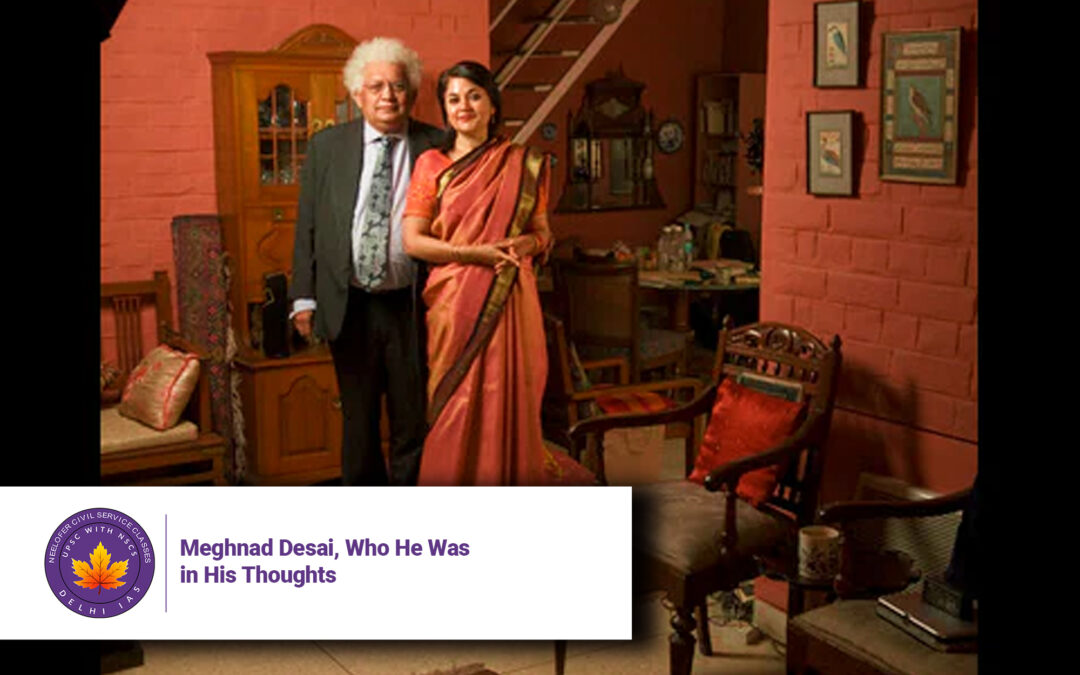Meghnad Desai, Who He Was in His Thoughts
Why in News
On July 29, 2024, Lord Meghnad Desai, eminent economist, academic, and political thinker, passed away at the age of 85. His demise has left a deep void in the intellectual and social circles of India and the United Kingdom. Meghnad Desai was not only a celebrated professor at the London School of Economics (LSE) but also a member of the House of Lords in the UK. He was conferred the Padma Bhushan in 2008 for his outstanding contributions to literature and education.
His death has sparked reflection on his extraordinary journey — from an Indian-born scholar who studied abroad, to a global intellectual who influenced economic and political thought, and finally to a man who, despite renouncing his Indian passport, never severed the emotional ties with his roots.
Introduction
The life of Meghnad Jagdishchandra Desai is a fascinating story of scholarship, global recognition, and a unique blend of intellectual boldness with personal humility. Born in Baroda, he pursued higher education in India and later completed his doctorate at the University of Pennsylvania. He subsequently taught at LSE, where he became one of the most influential voices in economics and governance.
Desai’s legacy lies not just in his academic work, but also in the way he bridged India and the West, engaging with ideas across civilizations. While he declared that he did not see himself as “Indian” after marrying an Englishwoman and giving up his Indian passport in 1976, his actions often reflected a deep emotional connection with Indian traditions, culture, and people.
His marriage to Kishwar Ahluwalia in 2004 was a testimony to his embrace of both personal and cultural continuity. With a sindoor ritual during their wedding, Desai publicly acknowledged his Indian roots, symbolizing that intellectual cosmopolitanism and cultural belonging could coexist.
Key Issues and Background
1. Academic and Intellectual Journey
-
Meghnad Desai was widely respected for his scholarship in economics.
-
He became Professor Emeritus at LSE, where he also founded the Centre for the Study of Global Governance in 1992.
-
His research and writings covered global economic structures, Marxist theory, development studies, and governance, influencing debates in both India and the UK.
2. Political Role in the UK
-
Desai joined the Labour Party in 1971 and later became a member of the House of Lords in 1991.
-
He chaired the Labour Party from 1986 to 1992, marking his significant involvement in British politics.
-
While he formally declared that he was no longer an Indian citizen, he often wrote about Indian politics, economics, and history, contributing valuable perspectives.
3. Personal Identity and Indian Roots
-
Despite renouncing his passport, Desai could never escape the pull of India. His colleagues and friends noted how his love for Indian traditions, culture, and cinema remained intact.
-
His marriage with Kishwar symbolized this dual identity — a man who was British by citizenship but Indian at heart.
-
As his friends recounted, Desai would pull out a pouch of sindoor at his wedding to Kishwar, a deeply Indian gesture, showing that cultural identity runs deeper than official documents.
4. Contributions to Public Discourse
-
Desai was known for his sharp intellect and ability to engage in discussions across a wide range of topics.
-
He was admired as a civilized conversationalist, always willing to listen, debate, and teach.
-
His writings, speeches, and public appearances enriched debates on India’s political economy, governance, and global challenges.
Specific Impacts or Effects
-
On Economics and Academia
-
Desai’s academic contributions shaped the understanding of global governance at LSE.
-
His Marxist scholarship and critiques influenced younger economists and researchers.
-
He trained and mentored several students who went on to hold key positions globally.
-
-
On Political Thought
-
His journey reflected the integration of immigrant voices into British politics.
-
By being both an insider (member of the House of Lords) and an outsider (immigrant with Indian roots), he enriched the discourse on multiculturalism and identity.
-
-
On Indian Discourse
-
Although he declared himself “not Indian,” Desai often returned to Indian themes in his writings, such as economic reforms, governance, and historical thought.
-
His insights bridged Western academic frameworks with Indian realities, making him a unique voice in India’s intellectual landscape.
-
-
On Society and Culture
-
Desai and his wife Kishwar became beloved members of Delhi’s social circles. They spent time in London, Delhi, and Goa, balancing global intellectual life with personal bonds in India.
-
His open-mindedness, love for films (including his admiration for actor Dilip Kumar), and willingness to engage across cultures made him a rare cosmopolitan thinker.
-
Challenges and the Way Forward
The passing of Meghnad Desai raises important questions for India and the global intellectual community:
-
Sustaining Intellectual Bridges
-
Desai embodied the role of a thinker who could bridge the East and West. The challenge now is to cultivate more scholars who can straddle both worlds and contribute to mutual understanding.
-
-
Preserving Conversational Civility
-
In today’s polarized times, Desai’s hallmark of civil, informed debate is a lesson to remember. The challenge for academia and politics is to maintain such civility while engaging in disagreements.
-
-
Revisiting Indian Thought
-
His participation in the launch of Echoes of Eternity: A Journey Through Indian Thought highlights the need to study India’s intellectual traditions with global seriousness. Future scholars must continue this dialogue.
-
-
Recognizing Immigrant Contributions
-
Desai’s life is a reminder of how immigrants enrich their adopted nations. The challenge for societies worldwide is to create space for such contributions while respecting diverse identities.
-
Conclusion
Meghnad Desai’s life cannot be boxed into simple categories. He was at once British and Indian, an economist and political thinker, an academic and a social conversationalist. While he often insisted he was no longer Indian, his actions — from his sindoor ritual at marriage to his lifelong engagement with Indian thought — revealed that he carried India within him.
His passing is not just the end of an academic career but the conclusion of a rare life that connected worlds, ideas, and people. For his friends, he will be remembered as a loyal companion; for his students, as a sharp intellectual; and for the world, as a thinker who refused to fit neatly into one identity.
As Pavan K. Varma summed up, the greatest thing about Meghnad Desai was that “he was a well-informed and civilised conversationalist, from whom you always learnt something.” That legacy of learning, humility, and intellectual curiosity is perhaps his most enduring gift.
5 Questions and Answers
Q1. Who was Meghnad Desai and why is he significant?
A1. Meghnad Desai was a renowned economist, academic, and political thinker. He taught at the London School of Economics, served in the UK House of Lords, and contributed significantly to global debates on governance, economics, and Indian political thought. He was awarded the Padma Bhushan in 2008.
Q2. Why did Meghnad Desai give up his Indian passport?
A2. Desai renounced his Indian passport in 1976 after marrying an Englishwoman and settling permanently in the UK. Despite this, he maintained strong cultural and emotional ties to India.
Q3. What were Meghnad Desai’s major academic contributions?
A3. He was Professor Emeritus at LSE, where he established the Centre for the Study of Global Governance. His scholarship covered Marxist economic theory, development studies, and global governance, influencing both academia and policy.
Q4. How did Meghnad Desai balance his identity between India and the UK?
A4. While he declared himself British, Desai never fully detached from India. His marriage to Kishwar Ahluwalia, his engagement with Indian intellectual traditions, and his involvement in Indian public life reflected his enduring connection with his roots.
Q5. What is Meghnad Desai’s lasting legacy?
A5. His legacy lies in his ability to bridge cultures and ideas, his role as a civil conversationalist, and his contributions to global economic and political discourse. He will be remembered as both a scholar and a loyal friend who touched lives across nations.







